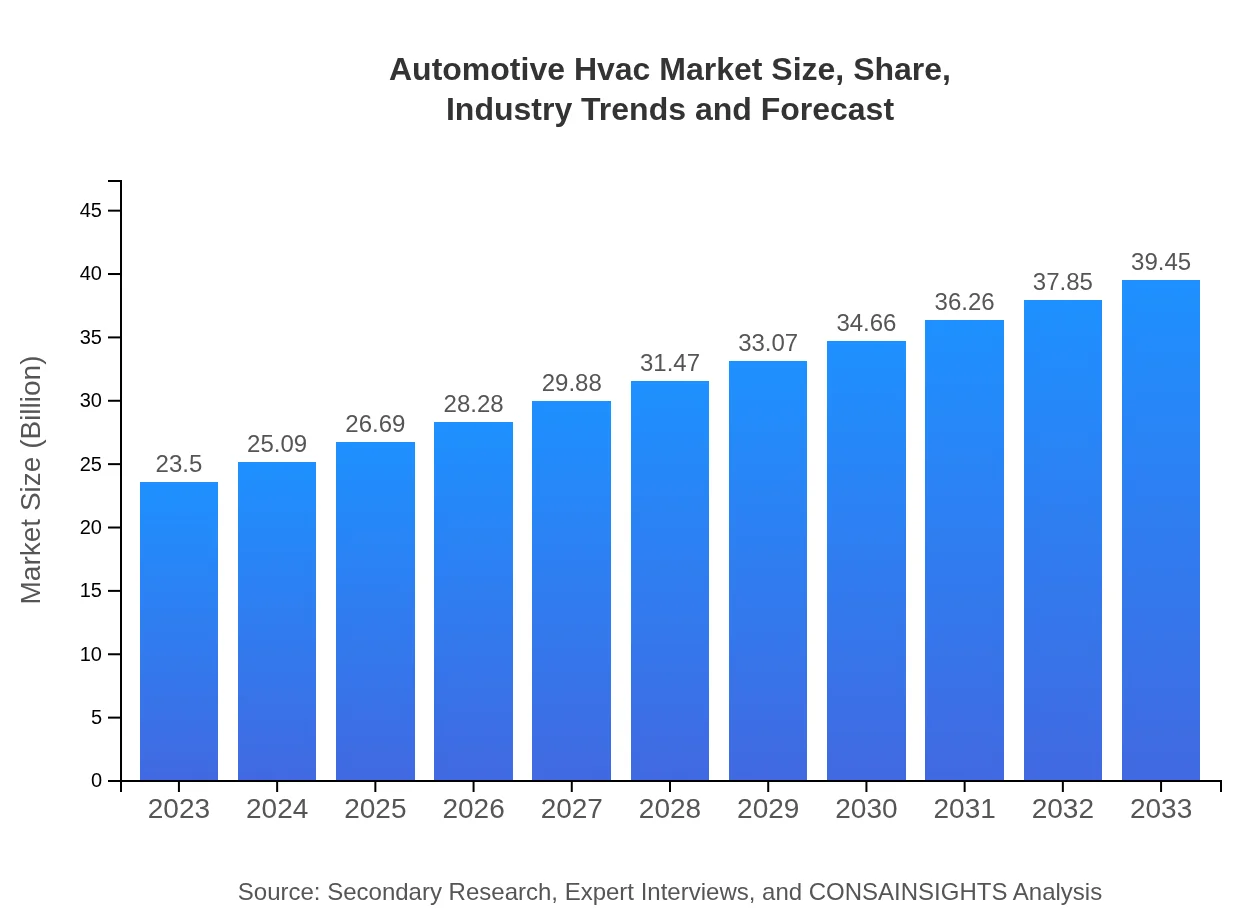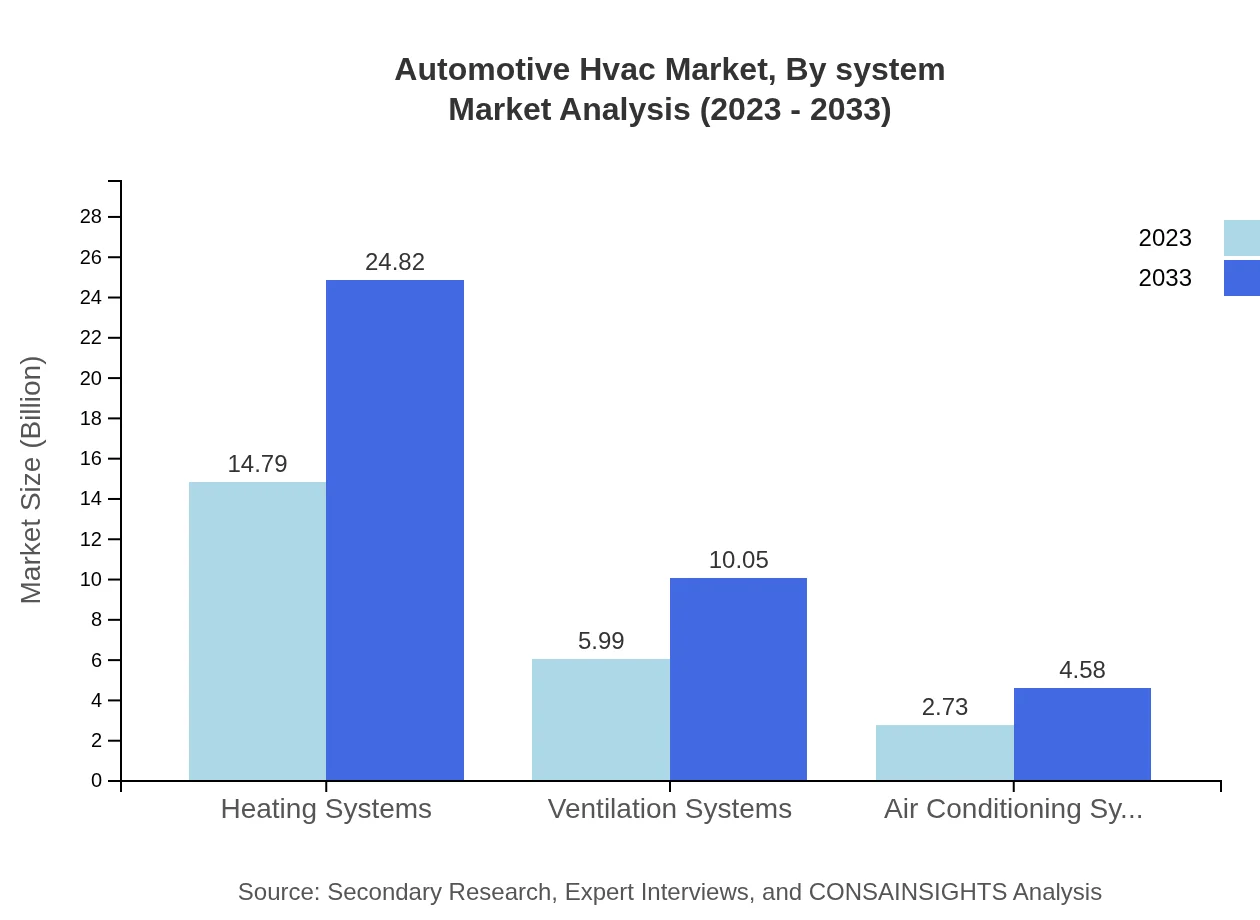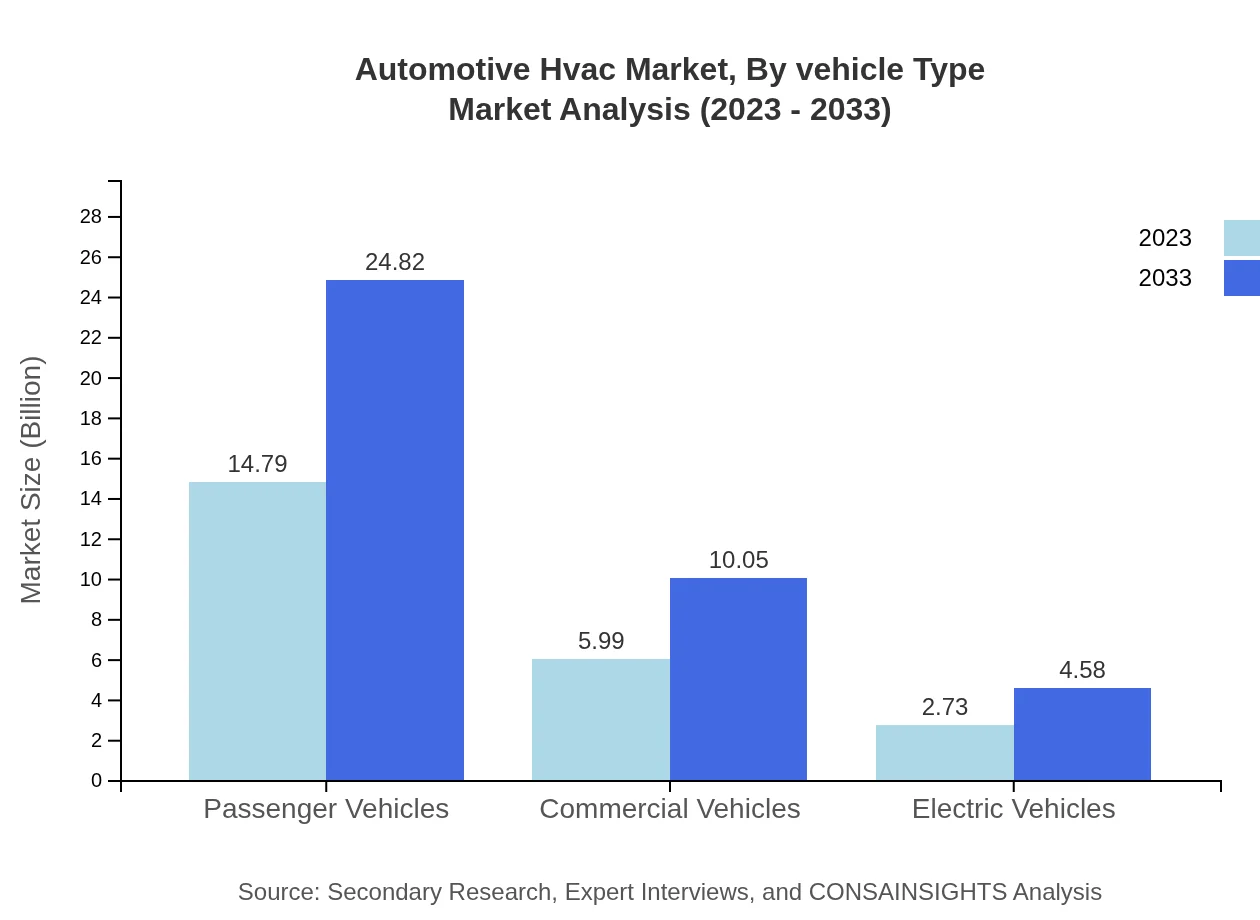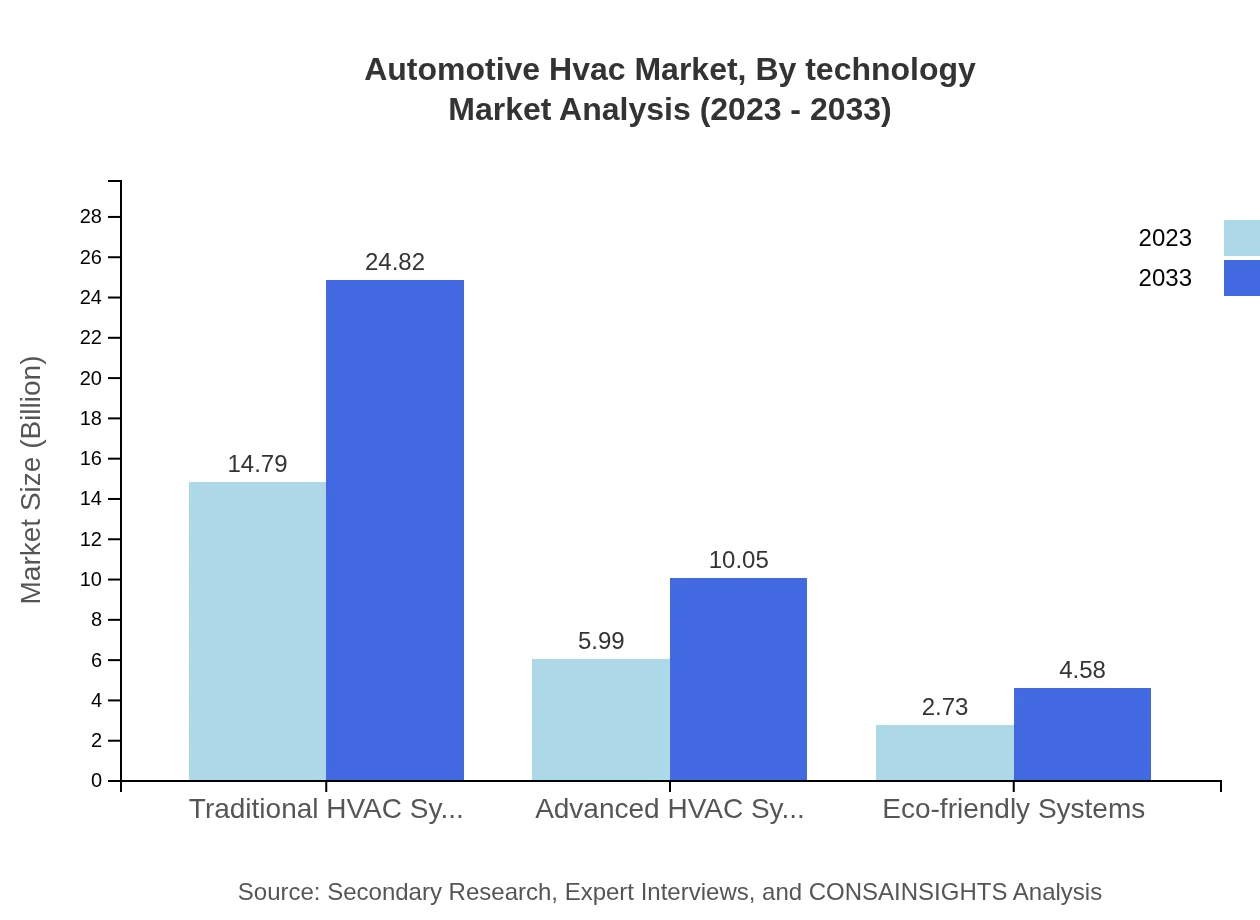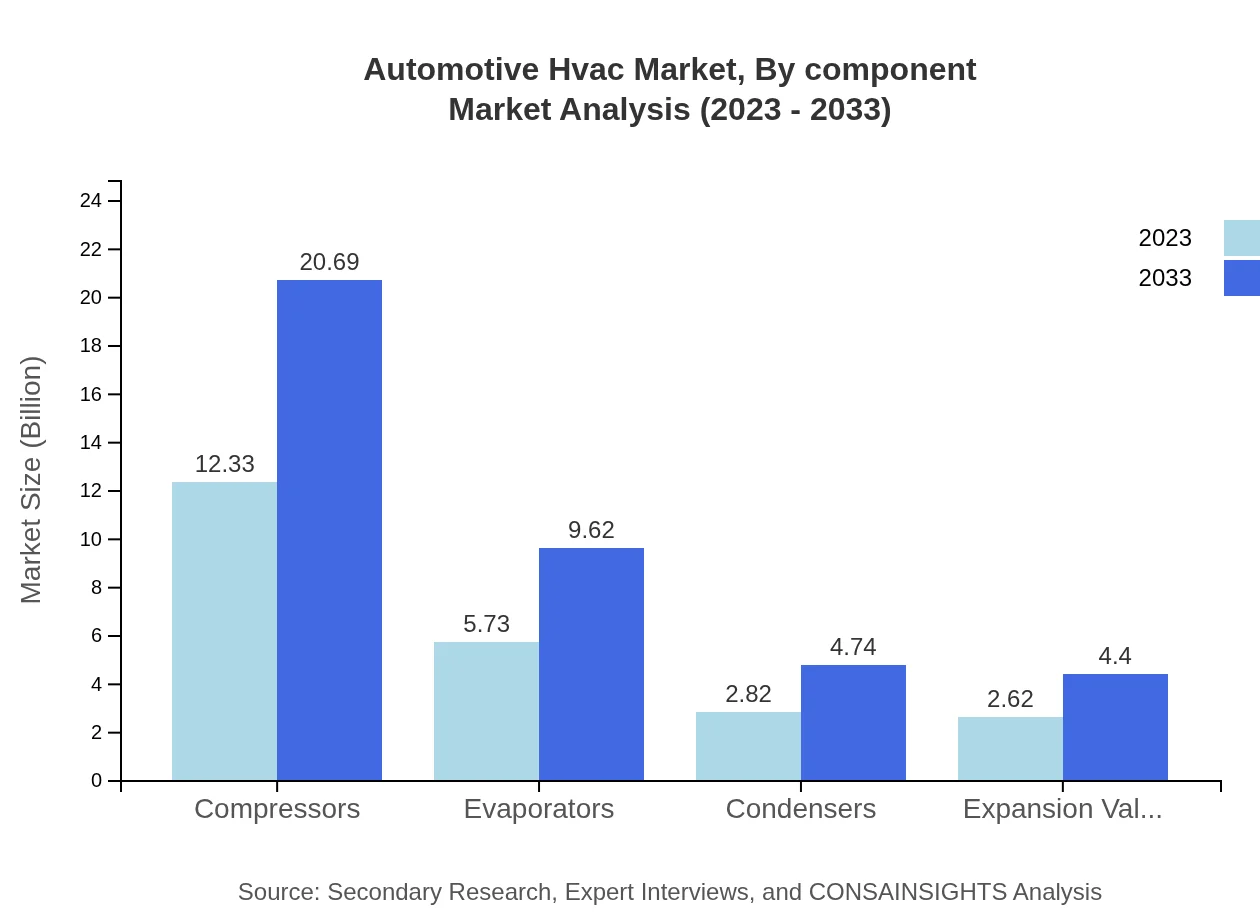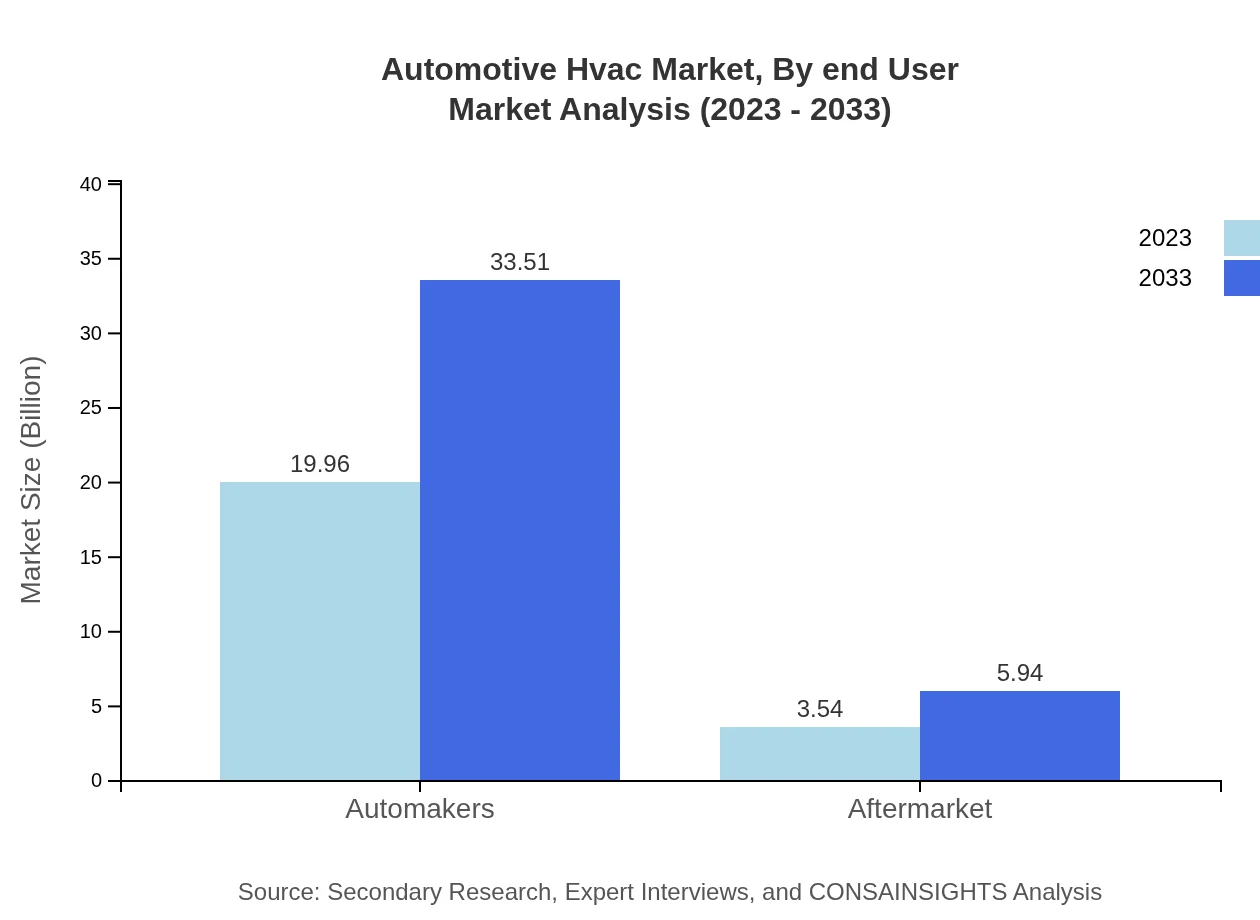Automotive Hvac Market Report
Published Date: 02 February 2026 | Report Code: automotive-hvac
Automotive Hvac Market Size, Share, Industry Trends and Forecast to 2033
This report provides a comprehensive analysis of the Automotive HVAC market, including trends, forecasts, and insights from 2023 to 2033. It covers market size, growth rates, segmentation, regional insights, and leading players in the industry.
| Metric | Value |
|---|---|
| Study Period | 2023 - 2033 |
| 2023 Market Size | $23.50 Billion |
| CAGR (2023-2033) | 5.2% |
| 2033 Market Size | $39.45 Billion |
| Top Companies | DENSO Corporation, Robert Bosch GmbH, Valeo SA |
| Last Modified Date | 02 February 2026 |
Automotive Hvac Market Overview
Customize Automotive Hvac Market Report market research report
- ✔ Get in-depth analysis of Automotive Hvac market size, growth, and forecasts.
- ✔ Understand Automotive Hvac's regional dynamics and industry-specific trends.
- ✔ Identify potential applications, end-user demand, and growth segments in Automotive Hvac
What is the Market Size & CAGR of Automotive Hvac market in 2023?
Automotive Hvac Industry Analysis
Automotive Hvac Market Segmentation and Scope
Tell us your focus area and get a customized research report.
Automotive Hvac Market Analysis Report by Region
Europe Automotive Hvac Market Report:
In Europe, the Automotive HVAC market stood at $6.38 billion in 2023 and is expected to expand to $10.71 billion by 2033. The stringent emission regulations and a focus on energy-efficient vehicle technologies contribute to this growth.Asia Pacific Automotive Hvac Market Report:
In the Asia Pacific region, the Automotive HVAC market was valued at $4.47 billion in 2023 and is expected to reach $7.50 billion by 2033, reflecting a significant growth opportunity driven by rising vehicle production in countries such as China and India.North America Automotive Hvac Market Report:
North America, particularly the United States, represents a substantial market with a value of $8.26 billion in 2023, projected to grow to $13.87 billion by 2033. The region's emphasis on luxury vehicles and advancements in HVAC technology are key drivers.South America Automotive Hvac Market Report:
South America is seeing growth in the Automotive HVAC market, where it was valued at $2.18 billion in 2023, anticipated to grow to $3.66 billion by 2033. The increasing demand for vehicles in Brazil and Argentina is influencing this growth.Middle East & Africa Automotive Hvac Market Report:
The Middle East and Africa market was valued at $2.21 billion in 2023, with expectations to reach $3.71 billion by 2033. Increased vehicle sales driven by infrastructure development is bolstering HVAC market growth in this region.Tell us your focus area and get a customized research report.
Automotive Hvac Market Analysis By System
The automotive HVAC market segmented by system type comprises heating systems, ventilation systems, and air conditioning systems. As of 2023, heating systems dominate the market with a share of 62.92%, ensuring comfort during cold conditions. By 2033, heating systems are expected to maintain their lead with market revenues reaching $24.82 billion.
Automotive Hvac Market Analysis By Vehicle Type
Segmented by vehicle type, passenger vehicles constitute the largest share, holding 62.92% in 2023. The market for passenger vehicle HVAC systems is projected to grow from $14.79 billion in 2023 to $24.82 billion by 2033, reflecting the increasing production and sales of passenger vehicles globally.
Automotive Hvac Market Analysis By Technology
Technology segmentation includes traditional HVAC systems and advanced systems. Traditional systems currently hold a significant share at 62.92%, while the advanced systems segment is growing as manufacturers seek to incorporate innovations such as variable refrigerant flow (VRF) for enhanced efficiency.
Automotive Hvac Market Analysis By Component
The HVAC components market is led by compressors and evaporators, with compressors accounting for 52.46% of the market. By 2033, the HVAC components' performance and efficiency will be crucial as manufacturers adapt to the needs of electric and hybrid vehicles.
Automotive Hvac Market Analysis By End User
The end-user market consists primarily of automotive manufacturers and aftermarket segments. Automotive manufacturers dominate the space, holding an 84.94% share due in large part to the integration of HVAC systems directly into the vehicular manufacturing process.
Automotive Hvac Market Trends and Future Forecast
Tell us your focus area and get a customized research report.
Global Market Leaders and Top Companies in Automotive Hvac Industry
DENSO Corporation:
DENSO is a global automotive components manufacturer and a leader in the HVAC market. The company specializes in high-efficiency HVAC systems for various vehicle types, emphasizing environmentally-friendly solutions.Robert Bosch GmbH:
Robert Bosch is a multinational engineering and technology company renowned for its automotive components. They offer innovative HVAC systems that enhance vehicle efficiency and passenger comfort.Valeo SA:
Valeo is known for its cutting-edge HVAC technologies, including advanced climate control systems that address the challenges posed by electric vehicles. The company's focus on R&D drives its market leadership.We're grateful to work with incredible clients.









FAQs
What is the market size of Automotive HVAC?
The automotive HVAC market size is projected to reach approximately $23.5 billion by 2033, growing at a CAGR of 5.2% from its initial valuation of $14.78 billion. This growth reflects the increasing demand for comfortable automotive climates globally.
What are the key market players or companies in the Automotive HVAC industry?
Key players in the automotive HVAC industry include major manufacturers such as Denso Corporation, Valeo, Mahle GmbH, and Sanden Corporation. These companies are pivotal in driving innovations and ensuring a competitive market landscape.
What are the primary factors driving the growth in the automotive HVAC industry?
Growth in the automotive HVAC sector is driven by factors such as rising vehicle production, increasing consumer demand for passenger comfort, advancements in HVAC technologies, and growing trends towards electric and eco-friendly vehicles.
Which region is the fastest Growing in the automotive HVAC market?
North America, with a market size projected to grow from $8.26 billion in 2023 to $13.87 billion by 2033, is currently the fastest-growing region. Additionally, the Asia Pacific region is also experiencing substantial growth.
Does ConsaInsights provide customized market report data for the automotive HVAC industry?
Yes, ConsaInsights offers customized market report data tailored to specific needs within the automotive HVAC industry. Clients can request insights focusing on unique factors, such as regional analyses or segmentations.
What deliverables can I expect from this automotive HVAC market research project?
From this market research project, clients can expect comprehensive reports including market size estimates, growth forecasts, competitive landscape analysis, and detailed segmentation data covering regions and market players.
What are the market trends of automotive HVAC?
Key trends in the automotive HVAC market include increased integration of advanced HVAC systems in vehicles, rising demand for eco-friendly cooling solutions, and ongoing innovations in heat exchanger technologies, leading towards improved energy efficiency.

